The Argentine elections will be held this Sunday, October 22, 2023. Many things can happen in these elections, incumbent National Deputy from the city of Buenos Aires Javier Milei seems to be the favorite, but it is not yet certain that he will win in the first round. Everything seems to indicate that there will be a second round.
The Argentine elections are marked by the inflation and insecurity that the country suffers year after year. A victory of Javier Milei would mean a drastic change in Argentina, a liberalization of the economy, a possible dollarization and the flexibilization of the labor market to make Argentina competitive in the international market. If Sergio Massa wins, Argentina will have the same policies it has had for the last 20 years. If Patricia Bullrich wins, Argentina will have an economic gradualism, although it will not be far away from Massa’s proposals.
Kirchnerism: A Defining Path in Argentine Politics
In politics, elections have been marked by “Peronism” with some exceptions. Peronism or Kirchnerism in Argentina is the political current that was formed with the arrival of dictator Juan Domingo Perón in 1940. Perón never defined the current ideologically, but it is clearly the so-called “third way”, neither left nor right, which includes aspects of both spectrums. Economically they are interventionist, i.e., nationalization of key sectors, subsidies, price controls. Political unionism is another of their political keys.
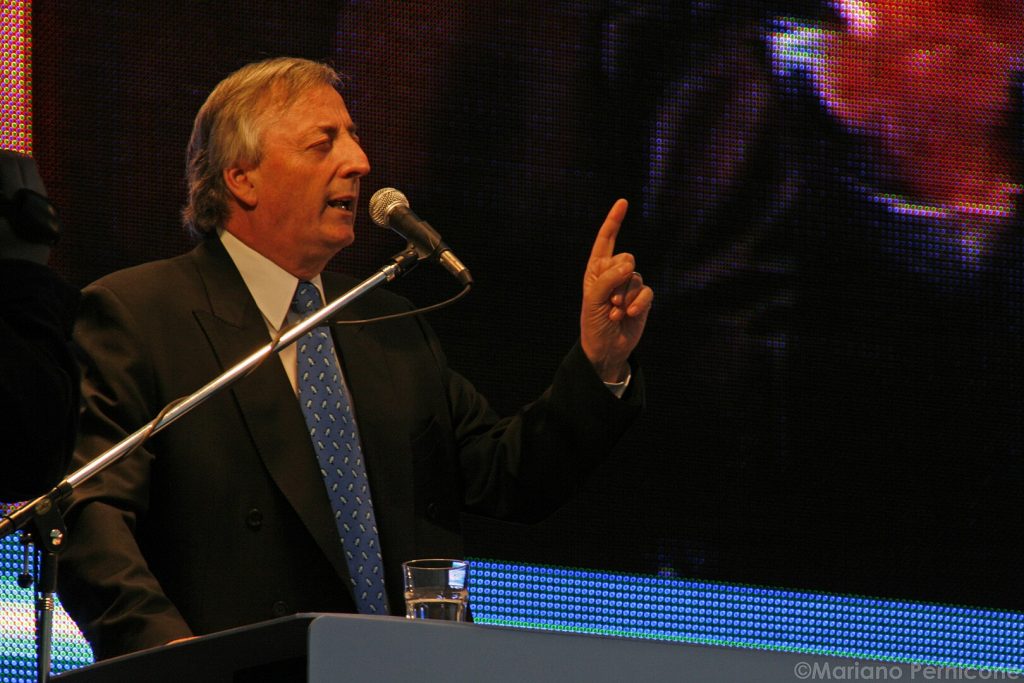
Nestor Kirchner (Photo by Mariano Pernicone / Frente Justicialista para la Victoria / Wikimedia Commons)
Kirchnerism is an offshoot of Peronism and emerged in 2003 with Néstor Kirchner and Cristina Kirchner. Kirchnerism is ideologically left-wing, like Peronism. It is also interventionist in the economy and totally rejects neoliberal ideas. Recent Kirchnerism, especially that of Cristina Kirchner, became moral progressivist, being at the forefront of the new feminist, environmentalist and pro-LGTB movements.
Since the creation of the movement with Néstor Kirchner, Kirchnerism has remained in power since 2005, with the exception of 2015 to 2019, with the victory of center-right candidate Mauricio Macri.
Macri, in 2015 came to power with a growing inflation with a rate of 25 percent fueled by an acceleration of the currency devaluation, the peso fell 24.5 percent in 2013 in the interbank market. They also received the country with a primary deficit of six percent of GDP and a financial deficit close to eight percent. The poverty situation was also quite bad, with 12.28 million people living in poverty and 2.74 million living in extreme poverty. This represented 29.29 percent and 6.54 percent of the population, respectively.
At the beginning of 2018, the Argentine government failed to obtain new international loans to pay the increasing interest on the new external debt contracted. Faced with the imminence of default, an exchange run occurred that would cause the Argentine peso to lose half of its value in dollars.
Policies since then could not stop the rising debt (100.4 percent of the GDP), could not stop inflation (53.8 percent in 2019), could not stop the devaluation of the Argentine peso and consequently caused poverty to increase to 35.5 percent of the population.
First of all, the pandemic has already caused a lot of talk, with very strict lock-downs and mandatory masks for a long time. Also, there was the controversy of the “VIP vaccinations”, where officials lined up to get vaccinated first. Fernandez later dismissed the health minister for this. Second, they lost the mid-term elections (note, there are legislative elections every two years, as in the United States, presidential elections are every four years), something that complicated the closing of the term. Thirdly, printing too much money, price controls, tax increases, and public spending destroyed the economy. The annual variation rate of the CPI (inflation) in Argentina in September 2023 was 138.3 percent, 13.9 points higher than the previous month. Fourth, the war situation further aggravated the economy, making commodities and energy even more expensive.
In fifth and last place, Cristina Kirchner was sentenced to 6 years in prison for corruption. An Argentine court found her guilty of defrauding the State, but acquitted her of the crime of illicit association.
Cristina defended herself by saying that it was all a “political” set-up and an unprecedented persecution.
Finally, the Milei phenomenon must be explained. Javier Milei, is an economist who defines himself as a “liberal/libertarian”, he has even once called himself an anarcho-capitalist. Milei became popular in 2017 when he was on Argentine television, insulting, shouting and making things clear to Argentine politicians. He is in favor of the state not intervening, in fact, he is not only in favor of it doing so in the economy, but in almost all areas, leaving only justice, defense and security. With Milei’s popularity, he joined forces with Espert, another Argentine economist, both critical of Kirchnerism and Macri, and they decided to create the Liberal Party. Later, Milei would end up dispensing with Espert and would ally himself with conservatives, in fact, in the midterm elections he was deputy together with Victoria Villarruel, a conservative. Milei renounced his salary, which he raffled every month, since the income was mandatory, this he did for his principles, since he does not want to be a “parasite” or “caste” as he calls politicians. For him, politics is a means to “implant freedom”, not an end of life.
The Most Important Contestants and Parties in the Elections in Argentina
La Libertad Avanza is Javier Milei’s party and it is the party that wants to make a more radical change in Argentina, proposing measures that have never been heard in Argentine politics. For this very reason, Milei is one of the main candidates that could become president of the Republic of Argentina.
Libertad Avanza is a libertarian party, proposing no state intervention in the economy, lower taxes, dollarization, reduction of public administration, withdrawal of most subsidies, labor flexibilization, even the dismantling and closing of the Argentine Central Bank.
Morally it is a conservative party, although its roots are libertarian, its union with the conservatives has made the moral part more conservative, such as having Christian values, the possible return of compulsory military service, the prohibition of abortion and other moral aspects.
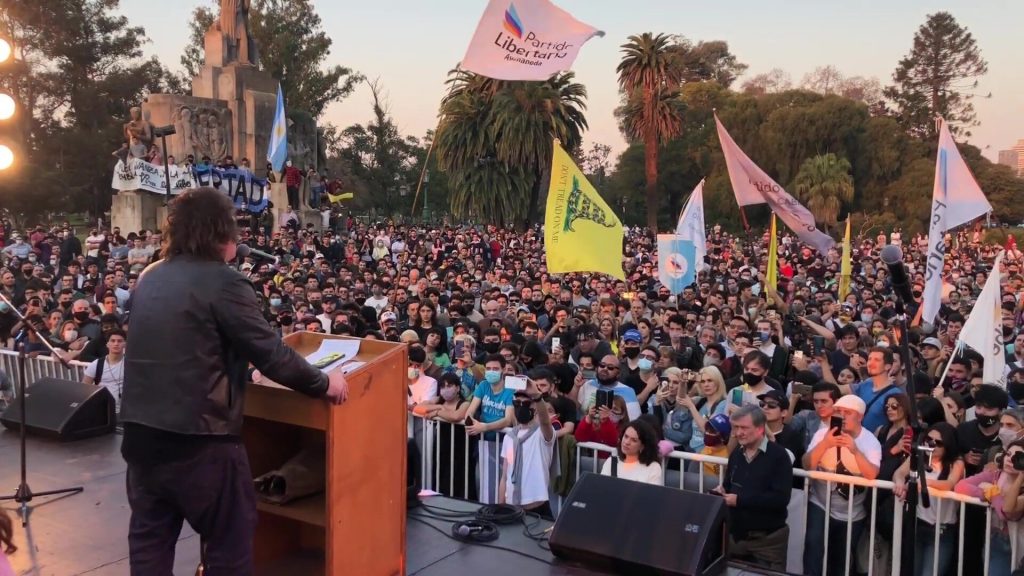
Javier Milei at a campaign event in 2021 (Photo by La Libertad Avanza / Wikimedia Commons)
Juntos por el Cambio is a union of parties: Propuesta Republicana, Unión Cívica Radical, Coalición Cívica ARI, Encuentro Republicano Federal, Generación para un Encuentro Nacional, Partido Demócrata Progresista, Partido Nacionalista Constitucional – UNIR. Ideologically it is difficult to define them, since they have a liberal sector, a very social democratic sector, a Keynesian sector and moderate Peronists. Many experts define it as a center-right or center party, something similar to the EPP in Europe. They are more open to the free market, but still keep in mind the importance of state intervention. Morally, they are more progressive.
Unión por la Patria is ideologically left-wing, like Peronism, they are also interventionist in the economy and totally reject what they call neoliberal ideas. Recent Kirchnerism, especially that of Cristina Kirchner, became moral progressivism, being at the forefront of the new feminist, environmentalist and pro-LGTB movements.
The Issues Marking the Argentine Elections
The Long Brief had the opportunity to interview Rocio Bonacci. Bonnaci is 27 years old and is a candidate for national congresswoman for the province of Santa Fe. She studied careers related to health and today works in her own business.
The economy is one of the most important aspects for Argentines, the currency has not stopped dropping in value since 2015. Likewise, inflation has not stopped increasing year after year.
Monthly rates have been higher than those accumulated interannually in Europe when there was the inflationary peak due to the monetary emission of the European Central Bank and the rise in energy prices produced by the Russian-Ukrainian war. For this very reason, the candidates have focused a lot on the economic section, the one who has focused more has been Javier Milei, the libertarian economist is the one who, since he appeared for the first time on TV without being a politician, has made a more economist speech. At the beginning his speech was more complex, however, when he came to politics he has had to make it simpler to reach more public.
“We Argentines are very concerned mainly about economic problems. September inflation was 12.7 percent and year-on-year inflation was 138.3 percent. People can’t make ends meet and, as the currency is almost worthless, they prefer to buy food, fuel or any other good, in order to get the pesos out of their hands,” said Bonnaci.
Security is another major issue in Argentina. Since the return of Kirchnerism, crime has been on constant increase. According to World Population Review, Argentina in 2021 was already ranked as the 20th most insecure country in the world, with Venezuela in the top 1. In fact, in 2023, it has become the most “violent” year in the city of Rosario, one of the most important cities in Argentina, with a total of 108 homicides until May 2023. In a biannual report published by the Supreme Court of Justice of the Nation, during the first half of the year there was a 21 percent increase in the participation of minors in criminal acts compared to the same period of the previous year. The few economic opportunities, a terrible security system, the feeling of impunity of criminals, the impossibility of self-defense and other conditions have made Argentina an increasingly insecure country.
“Insecurity is another pressing problem, since the justice system, with a very permissive doctrine, lets most criminals go free, who commit crimes again. People feel totally unprotected due to the lack of planning by the political class to solve these problems,” said Bonacci.
Surveys and analysis of possible results
It should be noted that Argentina, as in France, has a two-round system for presidential elections. In order to be elected president in the first round, the most voted candidate must obtain 45 percent of the votes or 40 percent and a difference of 10 points with the second candidate. Otherwise, there will be a run-off election, which according to the law must be held within 30 days after the general election.
Considering this fact, most of the polls that have been published in the last weeks have not shown any candidate with these premises, that is to say, there has not been any candidate that reaches 40 percent with 10 points of advantage and not even 45 percent. Most polls show that Milei is the one who would win by percentage, but it is not enough to win in the first round according to what the polls indicate.
#Argentina 🇦🇷 – encuesta RDT Consultores (8oct): Milei 🗽 lidera con contundencia.
🗽 Milei 36%
🔵 Massa 25%
🟠 Bullrich 22%
🟤 Schiaretti 5%
🔴 Bregman 4%1⃣4⃣ días hasta votar 🗳️.
↘️https://t.co/oYKVd9wa8I pic.twitter.com/0OtBOhv0OX
— EM-electomania.es (@electo_mania) October 8, 2023
The following poll shows that Milei would win with 36 percent, Massa with 25 percent and Bullrich with 22 percent.
This means that Javier Milei and Massa would go to the second round. This is the most favorable scenario for Javier Milei, since many who vote for Bullrich tend to be center-right and reject the more radical Kirchnerism embodied by Massa, so surely with these results, Milei could end up winning in the second round.
What would be dangerous and worrying for Milei would be if Milei were to win in the second round with Bullrich. At the beginning of September there were some polls that showed this possibility, but the latest polls at the end of September and beginning of October have already ruled out that this scenario is possible. But if it were possible, Milei would have a problem, since surely all those who voted for Massa would decide to vote for Bullrich to choose “the lesser bad” according to their ideology and thinking.
Although there is no poll showing that Milei will win in the first round, it is not ruled out that this could happen. “The probabilities are very high. Both Kirchnerism and Macrism have made it clear that they do not have concrete solutions for the country’s real problems. Argentines are tired of the usual politicians, we prefer to bet on a new project. Kirchnerism today has the state collection and social plans to ensure its core of voters, and the Macristas only have empty speeches of content, they thought that without clear ideas they would convince the electorate and the reality is that Milei, being the only one with a concrete proposal, was the one who ended up taking the majority of votes and continues to rise in the polls,” said Bonnaci.
What Would Javier Milei’s Victory Mean?
If Milei wins in Argentina it would be an unprecedented revolution. The models of the kirchneristas and the macristas have been similar, we could say that in the last 20 years, Argentina has always had the same policies.
For this very reason, what Milei proposes is so disruptive and that is why many Argentines tired of the same policies are the most popular candidate being an outsider, that is, a politician who does not come from the world of politics, but from the professional world, something similar to Donald Trump.
“The first thing Javier Milei wants to do is to provide economic stability and stop the uncontrolled monetary emission that, for many decades, has been generating inflation. Offer security and clear rules for those who want to invest in the country. It would mean a 180-degree turn in national policy, moving from welfare to the promotion of freedom and private initiative, to make Argentina a power again, as we once were. He would also represent, both in the South American region and globally, a ‘New Right’ leadership, an image similar to those of Donald Trump’s, Jair Bolsonaro’s or Viktor Orban’s. Javier could mean a union in the struggle for a West and a world free of collectivists and tyrants, those who destroy freedom and people’s lives,” said Bonnaci.

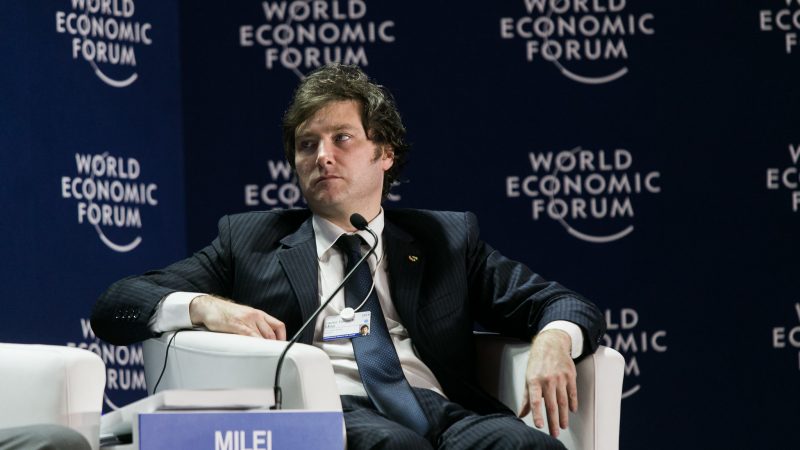
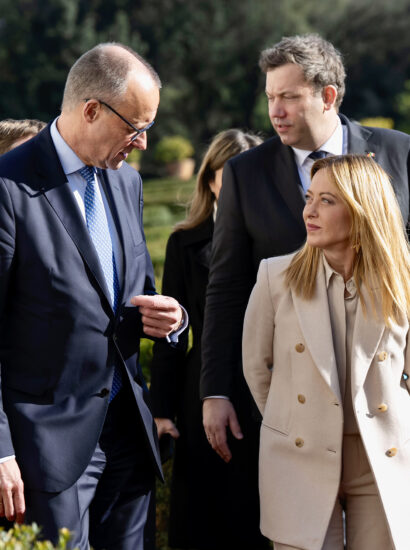
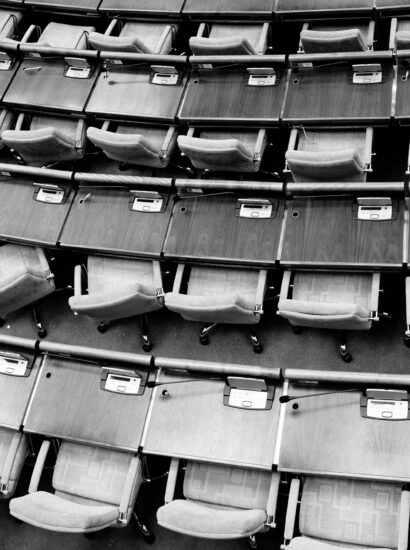
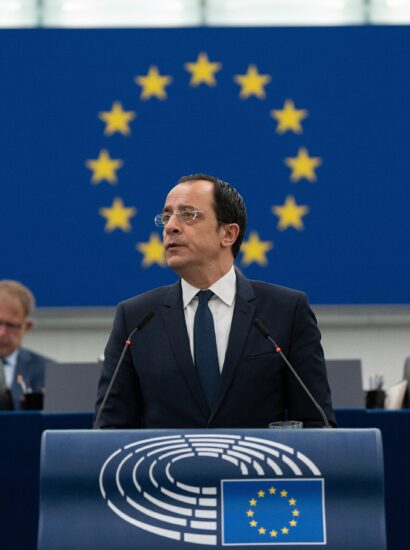
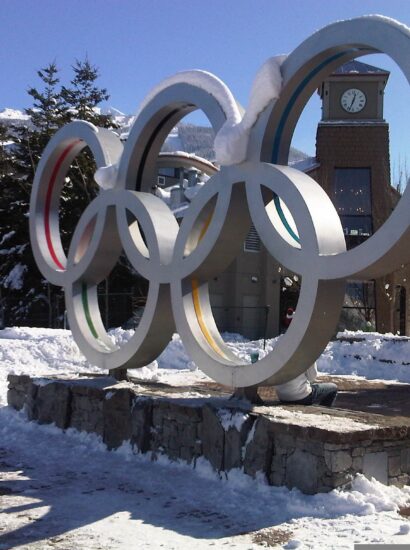


[…] take a look for a moment at the American continent. Argentina’s President Javier Milei supports a massive deregulation plan. Will you do the same if Chega! governs […]
[…] support of the former President of the United States Donald Trump, Nayik Bukele in El Salvador, Javier Milei in Argentina, José Antonio Kast (he eventually lost in the second round of the last presidential […]